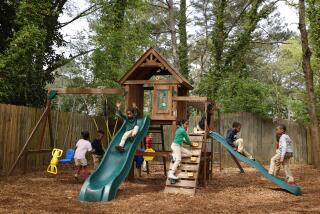Fargo, Ga., Battles to Save School That Holds Town Together
- Share via
FARGO, Ga. — The people of this swampside settlement have shunned formal government since the days when it was a logging camp, taking their problems and projects instead to town meetings at the schoolhouse.
The school has held the town together, but now it appears headed for closure, and residents fear that its demise will mean the end of Fargo just when the community is on the rebound.
The 250 or so residents are taking on the Georgia Department of Education to try to keep the state’s smallest elementary school open. The odds aren’t great, but the odds have been bad before and Fargo is still on most maps.
“Fargo is a can-do town, it’s the way towns used to be,” said Bill Oettmeier, a native son.
“It might take an act of Congress to keep our school. And there’s not but 58 students and we know that. But if we lose the school, it won’t be our fault,” said Rosemary Leviton, a school board member.
Fargo lies on the edge of the Okefenokee Swamp, just where the Suwannee River crawls out of the bog and heads south in no great hurry past Stephen Foster State Park. The songwriter who made the river famous, people in Fargo say, apparently never laid eyes on it.
Not Much to See
Not that there’s much to see.
Georgia Highway 89 barely slows down through the cluster of modest homes and small stores. Unincorporated since it was a logging camp at the turn of the century, Fargo has had little to do with governments--residents often pass the hat when the town needs something--and governments have returned the favor.
Nothing but pine trees will grow in the sandy, acid soil around the Okefenokee where a “hill” is any land with no standing water on it. In a disastrous fire 33 years ago, tens of thousands of acres of pines burned. But the trees were replanted and are becoming marketable. Now there is serious talk of a new mill, of more jobs so more people can stay in Fargo.
“We’ve spent 33 years trying to come back and the QBE (Quality Basic Education law) is hitting this little place in the head just when it’s trying to recover,” said Oettmeier, president of Superior Pine, which leases more than 200,000 acres of pine around Fargo to Champion Lumber Co.
Under Georgia’s Quality Basic Education law, a reform package passed by the Legislature in 1985, smaller school districts are being encouraged to consolidate isolated schools.
The Fargo school was built in 1952 for several times the current enrollment. But as loggers cut the trees the fire missed, people began to dribble out of Fargo. Clinch County operates the school, with its six teachers and one principal, on the $200,000 a year it gets in state “sparsity grants.”
Cut in Half
As things stand, that will be cut in half next year and then end. Fargo, the state has decided, doesn’t qualify for the grants, though for some children who live in its outer reaches the round trip to school in Homerville will mean nearly 100 miles a day on a bus.
Don Thornhill, director of facilities and transportation for the Georgia Board of Education, said that to qualify there must be no way the schools can be consolidated. Only a few meet that standard, he said, and consolidation is becoming common across rural Georgia.
If the grant stops, it will be up to Clinch County to decide whether to consolidate or use local funds to keep the school open.
“That is not really within the realm of possibilities,” said county School Supt. Tommy Lee. “This is a rural county that is losing jobs and losing people, and for us to take over the cost is out of the question.”
Clinch County raises less than a quarter of its annual $4.7-million school budget locally. It would have to raise local school taxes by some 25% to handle the $200,000 annual Fargo costs.
Lee said the concern over Fargo’s fate is very real, “but the board of education’s primary function is to educate children, not preserve towns.”
“If there is no school, (the lumber company) is going to want to know about it now,” Oettmeier said. “They’re not going to build a $40-million mill where nobody wants to work and live.”
Town leaders are lobbying state officials to try to keep the funding that will let the school remain open, and say they have some support. It may not be enough, many in Fargo realize, to save a way of life they cherish.
Don’t Lock Bikes
At the school, kids don’t lock their bikes. If a kid rode down the street on somebody else’s bike, the whole town would know. On a recent afternoon dogs waited outside a classroom for their young owners, and if one poked a nose in an open doorway, that was OK. In Fargo, people know whose dog is whose.
Fargo residents say it is this closeness and tranquility that makes them want to stay, raise families and pursue values that are endangered elsewhere, even if they have to travel 28 miles to the nearest pharmacy and most go to Valdosta, 50 miles west, to see a doctor or dentist.
For a time the nearest fire engine was in Homerville, so Fargo residents raised the money themselves to refurbish an old, donated engine. They passed the hat to air-condition the school and to build a ballpark, complete with lights. Homerville teams played night games in Fargo while waiting for a government grant to get a lighted park of their own, Oettmeier notes.
Danny Ellis, 25, who returned to his hometown to teach kindergarten and first grade, said all the town’s activities are centered at the school. “The senior citizens have their programs here, the first aid and first response groups meet here. So do the Boy Scouts and the PTA.”
The school hosts the community Christmas program. Gift baskets are distributed from the school to the less fortunate.
“It all happens from the school,” Ellis said. “If the school closes, the town will close.”
More to Read
Sign up for Essential California
The most important California stories and recommendations in your inbox every morning.
You may occasionally receive promotional content from the Los Angeles Times.













